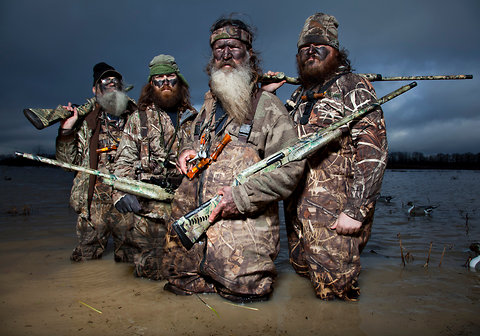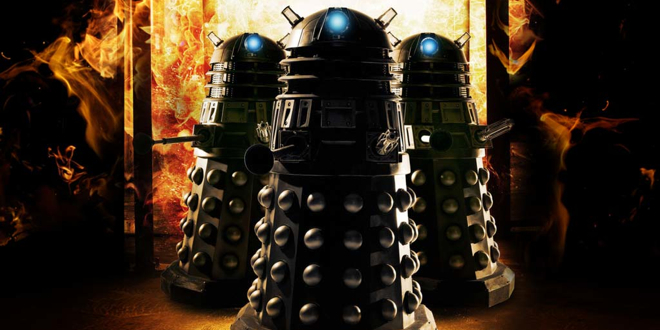 Until last Wednesday (December 18, 2013) the funniest elements of Duck Dynasty were the beards, Uncle Si and Uncle Si’s beard. But then reality hit the reality TV show.
Until last Wednesday (December 18, 2013) the funniest elements of Duck Dynasty were the beards, Uncle Si and Uncle Si’s beard. But then reality hit the reality TV show.
On Thursday, and even more humorous than the show and beards, the patriarch of the family Phil Robertson was suspended for an anti-gay slur. That someone cannot voice a real remark, however obnoxious, on a reality TV show is rather ironic and quite hilarious. Spouses should await a similar suspension from the family for a week for the next household faux pas. Or, could it be that the show is somehow scripted by A&E management anxious to cash in on the next fleeting opportunity?
By Friday the situation has become even more surreal — the politicians and bible thumpers had jumped in. The silly season had begun. The chorus from conservatives has been deafening: “it’s about faith”, “it’s about sin”. But most seem to forget that in our consumer-oriented, market-driven society it’s really about money. So if advertisers blink because one or more members of the Duck Dynasty commercial franchise is a bigot, so be it. That’s free speech and money is the ultimate equalizer. The market has spoken.
That said, one wishes that politicians, pundits and prosletyzers could be suspended as well.
From the Washington Post:
Few could have predicted that the story lines of the hit A&E reality show “Duck Dynasty” and the 2016 presidential contest would converge.
But that unexpected mash-up played out Thursday as conservative politicians rushed to defend Phil Robertson, the shaggy-bearded, homespun star of the breakout series, who was suspended by the cable network after his published comments about gays stirred a storm of controversy.
Louisiana Gov. Bobby Jindal (R), a likely White House contender whose state is home to the show about a family that runs a duck-hunting gear enterprise, called Robertson and his family “great citizens.”
“The politically correct crowd is tolerant of all viewpoints, except those they disagree with,” Jindal said in a statement prominently displayed on his official Web site, adding: “I remember when TV networks believed in the First Amendment.”
Sen. Ted Cruz (R-Tex.), another probable 2016 candidate, chimed in on Facebook, writing: “If you believe in free speech or religious liberty, you should be deeply dismayed over the treatment of Phil Robertson.” And 2008 GOP vice presidential nominee Sarah Palin wrote in a Facebook post that “those ‘intolerants’ hatin’ and taking on the Duck Dynasty patriarch for voicing his personal opinion are taking on all of us.”
Their embrace of Robertson — who in an interview with GQ described “homosexual behavior” as sinful and compared it to bestiality and infidelity — underscored how gay rights remain a potent political issue for many religious voters on the right.
As the same-sex marriage movement has gained steam, many evangelicals and conservative Catholics feel as if they are being asked to give up deeply held beliefs — an effort they perceived in the quick suspension of the “Duck Dynasty” star after his comments were denounced by gay rights groups.
The furor is reminiscent of the protests and counter-rallies of support that swirled around the fast-food chain Chick-fil-A last year after its president said the company supported “the biblical definition of the family unit.”
Conservative Christians “feel like they’re under siege in a culture that is increasingly intolerant and discriminatory toward their views, and they don’t feel represented,” said Ralph Reed, founder of the Faith & Freedom Coalition, who noted that Robertson paraphrased from the Bible’s Book of Corinthians in his interview. “I did not get any impression at all that there was animus expressed,” Reed said
By jumping into the “Duck Dynasty” maelstrom, conservative leaders such as Jindal and Cruz sent a clear message to evangelical voters: We’re on your side.
“Make no mistake,” Reed said, “these voters are paying attention, and they are going to remember who stood up.”
The controversy played out on the very day that opposing cultural forces were on full display. New Mexico’s highest court legalized same-sex marriage, the 17th state to allow gays and lesbians to wed. And figure skater Brian Boitano announced he is gay, making him the third gay member of the U.S. delegation who will travel to Russia in February for the Winter Olympics.
The cross-currents spotlighted the schism over gay rights that persists in parts of the country.
“This shows that there clearly needs to be more engagement of the evangelical community if gay acceptance is going to become a reality,” said Gregory T. Angelo, executive director of the Log Cabin Republicans, a gay rights advocacy group.
Still, other gay rights advocates noted the growing number of moderate Republican leaders who have embraced the cause of same-sex marriage. Earlier this year, more than 100 Republicans signed a legal brief urging the Supreme Court to declare that gays and lesbians have a constitutional right to marry.
Fred Sainz, spokesman for the gay advocacy group Human Rights Campaign, said that “the days of making gay a wedge issue are dated.”
“I think they are outliers,” he said of Jindal, Cruz and Palin, adding that he believes they jumped into the “Duck Dynasty” controversy to appeal to “a niche base.”
But that base remains a powerful force in the Republican Party, particularly when it comes to presidential primaries in states such as Iowa and South Carolina.
Conservative activists said that the national push for gay rights could mobilize evangelical voters to the polls in new numbers in 2016, particularly if they feel there is a candidate running who reflects their beliefs.
David Lane, an influential Christian activist based in California who organizes pastor conferences, said he got an e-mail Thursday morning from a top Republican activist in Iowa who credited Jindal for speaking out quickly about Robertson’s suspension.
“What Jindal is doing is absolutely tremendous, from an evangelical and pro-life Catholic standpoint,” Lane said. “Spiritually speaking, we’re in a war.”
And Robertson, the blunt-spoken reality show star, is serving as the unexpected latest flashpoint. (Notably, his comments about gays — including a graphic description of which body parts are more desirable — have garnered substantially more attention than his contention in the same GQ interview that African Americans were happier in the era of Jim Crow laws in the South, calling them “singing and happy.”)
In the interview he said:“Start with homosexual behavior and just morph out from there. Bestiality, sleeping around with this woman and that woman and that woman and those men.”
Robertson issued a statement Thursday saying that he believes his mission is to spread the Bible’s teachings. “I would never treat anyone with disrespect just because they are different from me,” he said. “We are all created by the Almighty and like Him, I love all of humanity. We would all be better off if we loved God and loved each other.”
Read the entire article here.
Image courtesy of New York Times.



 In almost 90 years since television was invented it has done more to re-shape our world than conquering armies and pandemics. Whether you see TV as a force for good or evil — or more recently, as a method for delivering absurd banality — you would be hard-pressed to find another human invention that has altered us so profoundly, psychologically, socially and culturally. What would its creator — John Logie Baird — think of his invention now, almost 70 years after his death?
In almost 90 years since television was invented it has done more to re-shape our world than conquering armies and pandemics. Whether you see TV as a force for good or evil — or more recently, as a method for delivering absurd banality — you would be hard-pressed to find another human invention that has altered us so profoundly, psychologically, socially and culturally. What would its creator — John Logie Baird — think of his invention now, almost 70 years after his death?